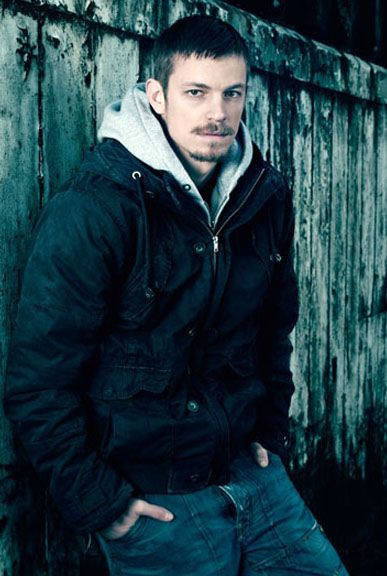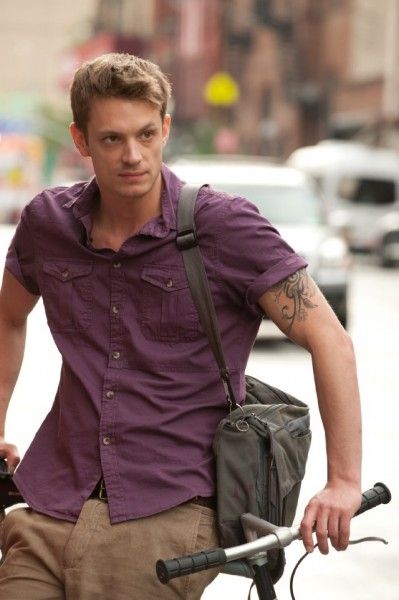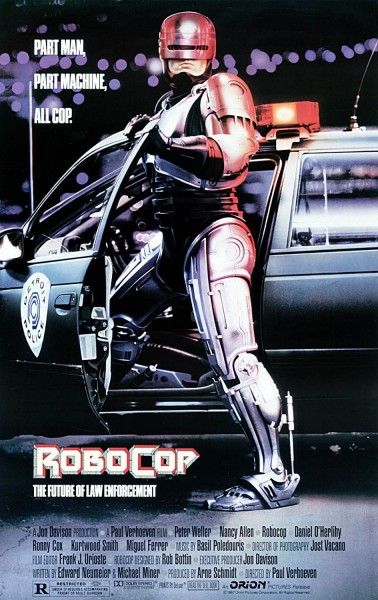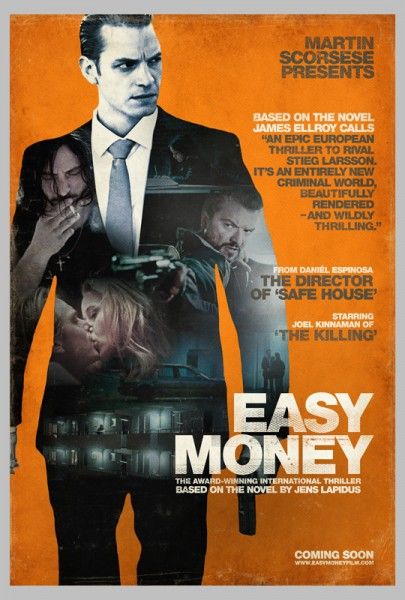Easy Money (aka Snabba Cash), from director Daniel Espinosa (Safe House), is a Swedish crime thriller based on the international best-selling novel by Jens Lapidus, now being presented in the U.S. by Martin Scorsese. The story follows JW (Joel Kinnaman), a lower-class business student living a double life with Stockholm’s wealthy elite. To keep up his lifestyle, he finds himself in deep with the dark world of organized crime and in an intensely dramatic struggle for life and death.
For the film’s press day, Collider spoke to actor Joel Kinnaman (The Killing), in both a roundtable and a 1-on-1 interview, about what it’s like to finally have U.S. audiences get to see the 2010 film, his desire to tell stories in the moral grey zone, how he finally ended up landing the role of JW, and what he finds most appealing about acting. He also talked about taking on a film with as much attention as the RoboCop re-imagining, how proud he is to have the opportunity to work with Gary Oldman, how surreal it is that the film already has a viral campaign, that he wants to do as much of his stunts as he can, how he felt about the Season 2 finale of his AMC drama series The Killing, and his hopes for a Season 3. Check out what he had to say after the jump.
Question: What’s it like to have someone like Martin Scorsese behind finally bringing this film to theaters in the U.S.?
JOEL KINNAMAN: It’s very flattering, and it makes us all very proud. I know Daniel Espinosa was very moved by that. If you see our movie, you’ll also feel that we’ve been seeing Mr. Scorsese’s movies growing up, and loving them very much. Of course, he’s been a huge inspiration.
A lot of gangster films focus very much on morals, and you don’t really know where a lot of the characters’ morals are in Easy Money. Was part of the appeal of this film the fact that it really sits in those grey areas?
KINNAMAN: Yeah. I think life takes place in the grey areas, or at least the interesting parts of life. I like to be a part of the stories that take place there. When it’s a moral grey zone, the audience has to think about what they feel and what they think is right or wrong. You want to affect your audience and make them think.
What was it that initially attracted you to the character of JW?
KINNAMAN: It was a best-selling book in Sweden, and I was in the last year of acting school when I read it. At that point, I had done three movies, one small part and two medium-sized parts, and only one of those movies was successful. I wasn’t a name in Sweden, at all, but I was feeling pretty confident. I read this book, and then I started to say to everybody, “I’m gonna play this character.” The book had just come out and it hadn’t even been adapted, but I was like, “I’m gonna do this. This is gonna be me. I’m just saying, this is gonna be me!”
And then, me and Daniel [Espinosa] had become friends. I got to know him when I auditioned for his first feature. I was up for a part in that movie, but then I had to turn it down because I got into the acting school that I had been trying to get into for a long time. It was a four-year commitment that was very prestigious. It’s actually the second most expensive education in Sweden, for the government, ‘cause all our colleges are free. That’s how it should be here, too. So, when I finished acting school, we started to develop this script together and were trying to get the funding for it. The movies in Sweden are at least 50% financed by the government, so we were trying to get that approval to get that money ‘cause then it’s really easy to get the other part. But, the script wasn’t 100%. And then, Daniel got Snabba Cash, or Easy Money, and he had just seen me do Crime and Punishment on stage, so he said, “This is you, man. You’ve gotta do it! Do you wanna do it?” I was like, “Are you kidding?! Of course, I wanna do it! I got it?” And he was like, “Yeah, you got it!” I’m such a fucking idiot that I went and told everyone I knew.
I was bragging for five months, “I’m gonna do JW! You know who’s gonna play JW? Me! I’m gonna do JW!” I’d started to get more movie parts and was on a roll, but I was not a name. He was really naive when he gave the role to me, and then he realized, “Wow, that’s gonna be a huge battle to just tell the producers of the biggest Swedish movie of that year that this guy is going to do the lead.” So then, he came back to me and was like, “You’re gonna have to audition for it.” It was six months later, and I was like, “What?!” I had told everyone. Now, all of a sudden, I had to audition for this movie that I had already thought I had gotten, and it made me so nervous. I had to audition seven times. It was mine to lose, and it was really traumatic. I was an emotional and psychological wreck, after that. But then, finally, I got it.
How do you view this guy? Is he a victim of circumstances or his own machinations, or is he just naive?
KINNAMAN: I think he was a lot of those things. My first thoughts around JW were based on the idea that he had a complex nature that is contradictory. He’s a very confident person, but with very low self-esteem. I think that’s an interesting combination. It’s more common than we think. And then, he’s also a chameleon, in many ways. I read it as that he has this void within him. For him, it’s often been enough to seem [a certain way]. It’s not as important to him to be something real. The choices of his life have led him further and further away from who he, himself, is. At this age that he is at out, he has no idea who he is. That leads a person with initially a very good heart to make extremely bad decisions. That was very fun to play. It’s also very fun to play a character that is an actor in his reality. Part of the performance that English speaking audiences won’t pick up on is that I made a big effort to have his dialect change with every person that he meets. When he’s with the upper-class, he talks like they do with their dialect. When he’s with the criminals, his way of speaking and his cadence changes. That was quite difficult. It took a lot of work and research, but it was one of those fun things to do.
JW goes through a lot of physical and emotional ups and downs, throughout the course of the film. Do you enjoy doing that kind of work, or do you prefer one over the other?
KINNAMAN: What I enjoy most with acting is when it’s a good scene with one or two other actors, and you feel a strong connection and you don’t know how you’re going to respond, and everybody is listening to each other and getting affected by each other, and even though you’ve rehearsed it many times, it feels like it’s happening right now. That’s when I get my biggest kick out of acting. In many ways, the biggest kick I can get out of acting is on stage, in a very good play with great actors. That is what I enjoy the absolute most, but it’s so fucking scary, too. It’s so scary to go on stage. I used to throw up before I went on stage, every time. Even though it’s only 200 people in the audience, and a movie like RoboCop is going to be seen by many, many people, I know I’d be much more nervous doing a play than being on set shooting. You’re always trying to look for material that is as challenging as possible, so that’s why I like stuff where the characters go through the most difficult times they’ve ever had in their life. It makes me push myself further and learn more about myself, and to deal with experiences that I’ve had. That’s what’s most appealing to me.
What do you enjoy about collaborating with director Daniel Espinosa? Was working with him on a big studio film like Safe House the same as when you worked together on Easy Money?
KINNAMAN: Yeah, he’s the same director and I’m the same actor. It was really fun! We were at this music festival in the north of Sweden, just a few days ago, and I had this conversation with him. It’s not so much what’s being said. It’s knowing him, having his energy, and knowing what he likes that brings out something in me. He also knows me very well, so if I have a problem and we don’t really reach where we want to go, then he knows what to say. But, it’s very much what I know that he likes. That puts me in a special place and it brings out the best in me.
How would you describe how you’ve progressed in your acting, and what you learned from Easy Money that you take with you into your current roles now?
KINNAMAN: Well, a big moment for me was when I did a play that was a new adaptation of Dostojevskij’s Crime and Punishment, and I played Raskolnikov. It was actually the first thing I did, when I got out of acting school. In Sweden, and a lot of Europe, there is this old romanticized idea of the wounded artist. In Sweden, a lot of the acting community are afflicted by that idea and gave themselves the right to be alcoholics because they are a wounded artist. I always felt that that idea was just such a stupid thing that I felt came from bad confidence that you can’t access those areas or experiences of your life, or that maybe you hadn’t had those experiences, so you’re trying to create it by yourself.
So, I’d gone through four years of acting school and was like, “That’s just bullshit!” The people that were in that whole world of being a wounded artist and presenting themselves that way to the world, I always felt that their performances were usually very limited and you could never see the struggle in the person because they were actually trying to be depressed. A depressed person is not trying to be depressed, they’re trying to be better. Somebody who is mentally ill is striving to feel good and be normal, and I could never see that strive in their performances. So, it was up to me to prove my point with Raskolnikov. It’s a character that I read as borderline schizophrenic, who’s starving himself to death, and then he goes through this severe psychosis, while he’s finding true love for the first time. It’s an incredible journey. I really tried to implement this idea, and it really worked. I was really happy with that performance, and people said that they’d never seen more light in that character and not as much depression.
That’s how I think it is. If you raise the high, the low is going to be lower. Usually, when you meet a person, you get an idea of who they are and you place them in a cabinet. It’s not until that person does something that completely contradicts that, that you get the feeling of, “Oh, that’s who you are.” Then, you see the whole span of that personality. That’s something that I try to bring to my performances. You can make an interesting character in a small portion of a movie, for a character that doesn’t have that much on the page, if you just find the contradictions. You have a lot more leeway to be contradictory than most of the scripts have in them. That’s how we all are. We have so many different sides of ourselves and we’re so different, in meeting with different people. The audiences relate more to that and find that more believable.
What can you say about Easy Money 2?
KINNAMAN: Well, it picks up where the first one ends.
How do you feel to be taking on RoboCop next, and what can you say about it?
KINNAMAN: It’s a re-imagining. There are ideas from the first movie that have been remade in the second one, but it’s a completely new take on it. We have a fantastic director, Jose Padilha, who reminds me of Daniel Espinosa, in some ways. He’s a very confident, bold director. He wrote, directed and produced Elite Squad and Elite Squad 2, which he also distributed. They’re the two highest-grossing films in Brazil, which is an audience of 150 million people. You need that kind of a strong force in a director that’s going to do his first movie with a big studio. You need a person that can stand his ground on certain things, and know which battles are worth fighting and where you compromise. If you’ve seen his movies, you know that he’s a very talented actor’s director. The acting is superb in his films, and the action is very, very believable. He also has a history of being a physicist. His knowledge of where robotics and neuroscience is now is a complete understanding of where the cutting edge is. He’s working with the writers on a plausible version of 2041, and that’s going to be very interesting. The core of it will be something of substance, and then you have the fireworks around it.
Since you were cast in RoboCop, Gary Oldman, Samuel L. Jackson and Hugh Laurie have been added to the film. What are you looking forward to, in working with a cast like that?
KINNAMAN: I don’t think I have any scenes with Samuel L. Jackson, but I have a lot of scenes with Gary Oldman. I’ve followed Gary Oldman for a very long time, even before I was interested in acting. But then, after I started making acting my profession, I’ve studied him. I’ve seen Nil by Mouth, the only movie that he wrote and directed, and I know that it’s based on his childhood. I’ve seen that movie five times. I find him incredibly inspiring to watch, so I couldn’t be happier. I’m so proud to get an opportunity to work with him.
Are you going to do your own stunts?
KINNAMAN: I won’t do any stupid things. I won’t jump off buildings. But, I’ll try to do as much as I can.
What’s it like to be a part of a movie where there’s already a viral campaign, even though it doesn’t come out for more than a year?
KINNAMAN: It’s pretty surreal. I saw it online. It’s cool! I realized, quite early, when I did a couple of interviews. You say just a few things about the movie, and it gets such traction. You understand that there’s going to be a lot of attention on it, and you adapt to that. That’s what’s reality.
Was that something you thought about, before signing on to do the film? Were you looking to get that kind of traction, or did you have any hesitation about taking on something so high-profile?
KINNAMAN: I was looking for a high-profile job. I was not eligible for a lot of different parts because I hadn’t done something with this kind of attention around it and that was really frustrating. I met with directors who said, “I’d love for you to play the lead in this movie. You’re the perfect person to play this, but there’s no way I can cast you in this because you don’t have that kind of a name and we need a name for this, so that we can get the financing.” So then, that made me want to get to that position where somebody wouldn’t not pick me because of that reason, at least.
Was the appeal of a character like this figuring out how to bring humanity to the role while wearing the metal suit?
KINNAMAN: Yeah. At first, when I heard about a RoboCop remake, I was like, “Okay, I’ll probably watch that movie, but I don’t think I wanna be in it.” And then, they told me that Jose Padilha was going to direct it and I was like, “Wait, the guy that did Tropa de Elite 1 and 2?” When they said, “Yeah,” I was like, “Oh, okay.” And, he wanted to meet me. I was like, “Oh, shit! Yeah, I’d love to meet him!” And then, when he told me about his take on this, I was like, “Wow, this is something really good and really worth trying to get.” Now, when I’ve been reading the scripts, his vision is really interesting. From an acting perspective, it’s really challenging and difficult stuff that I think can really say something.
Were you happy with the way Season 2 of The Killing wrapped up Rosie Larsen’s murder? Did the finale feel satisfying?
KINNAMAN: Yeah, I really liked the finale. I thought Patty Jenkins did a fantastic job on it. I was very, very happy that she was the one that directed it. It was a very difficult episode to direct. It could have gone wrong. But, I think she did a fantastic job on it. I thought it was satisfying. I thought people really deserved to get closure, after sticking with it for 26 episodes.
Do you know if there will be a Season 3 of The Killing?
KINNAMAN: No, I haven’t heard a thing.
Are you hoping for a Season 3, or do you feel like you have closure, if it doesn’t happen?
KINNAMAN: I won’t be devastated, but I’m really looking forward to playing another season. I really like Holder, and I’d love to continue his and Linden’s (Mireille Enos) journey together.
How much of the flavor of Holder was on the page when you were cast, and how much came from how you envisioned the character?
KINNAMAN: There were small indications in the pilot script that I went with. There was this line that he said when she asked him, “How was it in Narco?,” and he said, “You know, Brahim shooting Rakim, blah blah blah.” That line was what took me in that direction with him and gave him an urban flavor. That’s where his wiggerisms came from.
Easy Money opens this week in limited release.





